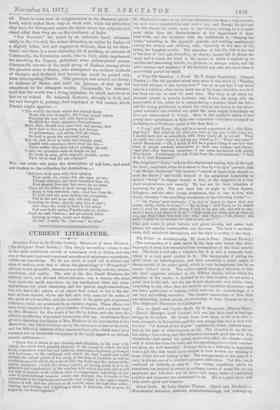A Very Old Question: a Novel. By T. Edgar Pemberton.
(Samuel Tinsley.)—The old question asked once more in this novel is," Whether love lead fortune, or else fortune love?" but we do not find it any more near to a solution, whoa we lay down one of the least attractive novels it has boon our fate to road for some time. The story is all about un- pleasant people—a miserly husband, who denies his dying wife the necessaries of life, while ho is accumulating a fortune, heads the list— and the young gentlemen to whom the roles of the lovers in the subse- quent narrative are confided are quite the most vulgar individuals we have yet encountered in fiction. Here is the author's notion of two young men—gentlemen, in their own estimation—who have accepted an invitation to a Christmas party at the East End:— " 'I say,' said Percy, this will be a novel experience, oh !—this East- End hop ? But what an old idiot you wore to say you would come too. I should have got on splendidly, with little Gerty all to myself. What on earth was your object in saying you would go ?'—' What was yours ?' asked Hammond.—' Oh, I think it will be a grand thing to see how this class of people conduct themselves in their own homes,' said Posey; ' and also—this between ourselves—I am quite fascinated with pretty Miss Gerty. I anticipate no end of fun from the ontertainmont.'—' And so do I,' said Hammond."
The delightful " Percy" talks in this elegant and feeling style all through the book ; concludes, when he is asked to dine by " Gerty'e" parents, that "‘ old Mother Northover " (his hostess) "stayed at home from church to cook the dinner ;" and avails himself of the misplaced hospitality to induce " Gerty " to engage herself to him, as she supposes, on a very short acquaintance, and secretly. He has not the least intention of marrying the girl. The pair most late at night in Gibson Square, Islington; and the other young gentleman, who is also in love with Gerty, becomes " the unwilling ovorhearer of the following words ":—
" Oh, Percy,' said Gertrude, I do feel so happy to know that you really, really, really love me My darling ' said Percy, as he kissed her.—' And for your sake, Percy, I will do as you ask, and tell no one, until I have your leave to do so.'—' Only meet me when and as often as you can, that I may kiss and love you,' said Percy.—' Oh, Percy,' she said, I shall be as anxious for that as you are ' " This pair come to great fortune and great trouble, and under both phases are equally contemptible and tiresome. The book is unwhole- some, dull, unnatural throughout, and the style is worthy of the story.






































 Previous page
Previous page